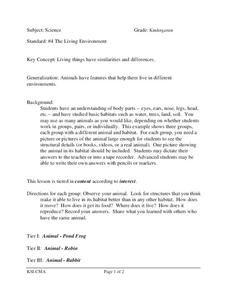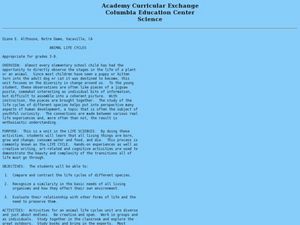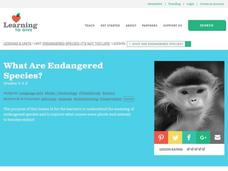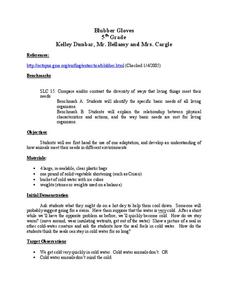Curated OER
Hunters and Gatherers
Sixth graders participate in mapping and other activities to understand why ancient civilizations developed as they did. In this ancient civilization lesson, 6th graders recognize that there were three important climate zones and...
Curated OER
The Living Environment
Students investigate animals and their environments. In this animal similarities and differences lesson plan, students explore animal adaptations and features and their habitats. Students get into groups to discuss the habitat and how...
Curated OER
Academic Raceway: Animals
This animals PowerPoint provides a race car game in which students answer a variety of questions about animals, the majority of which are based on ways in which animals adapt to their surroundings and behave to survive.
Curated OER
Crustacean Critters
Students explore the habitats of hermit crabs. In this crustacean lesson, students discover what animals need to survive. Working with live hermit crabs, students explore how hermit crabs have adapted to their habitats.
Curated OER
The Animal Kingdom of Vertebrates
Seventh graders classify fish according to their characteristics. In this classification lesson students learn how to group animals including birds, reptiles and amphibians.
Curated OER
Camouflage
Here is a lesson which incorporates ingenious hands-on activities that simulate how many animals use camouflage as a survival technique. This lesson clearly outlines how to implement the activities and discussion sessions found in it....
Curated OER
Fossil Kit I - Lesson Plan
Here is a 14-page lesson plan that deftly outlines a wonderful educational experience for your youngsters. In it, students learn about a variety of animals that have left behind clues of their existence in fossil form. Many excellent...
Curated OER
WWW = World Wide Wildlife
Through video, internet research, and hands-on activities, learners conduct a study of the interdependence between animals and the habitats they live in. They conduct Internet research independently in order to complete a report on a...
Project Noah
Writing Goes Wild
Young scientists develop their observation and writing skills as they craft and then post a detailed description of a plant or animal they have spotted and photographed.
24x7 Digital
TeachMe: 1st Grade
Let your eager learners practice their basic arithmetic and spelling skills with this fun interactive resource! For any primary grade teacher with access to an Apple mobile device, this is a must-have application.
Outdoor Learning Center
Outdoor Survival
Which of the following can you survive without for the longest time: water, food, or a positive mental attitude? The answer may surprise you. Guide learners of all ages through games, activities, and discussions about surviving in the...
National Wildlife Federation
What's Your Habitat?
How are third graders like rabbits? They both live in habitats and require food, water, and shelter to survive! An educational science lesson encourages your learners to think about their own habitats and survival needs, before comparing...
Curated OER
4-H Poultry Activity Page: Responsiblity
How many eggs does a chicken lay annually? A poultry project gets 4-H members experiencing the importance of responsibility and care of animals. They read about managing poultry and working with eggs, write a story about their flock,...
Curated OER
Outdoor Survival
Students are introduced to basic outdoor survival concepts. They identify the seven basic needs for survival. Students describe the symptoms and treatment for frostbite and hypothermia. They compare and contrast the value of different...
Curated OER
Fun On The Farm
Students experiment with a variety of resources to study about sounds and their sources (weather, animal, and transportation). They compare size, structure, and basic needs of living things. Each student studies about farm animals,...
Curated OER
Papier Mache Animals Sculptures
Fourth graders construct papier mache sculptures that emphasize texture, form and color. Each student chooses and constructs a unique papier mache sculpture of a farm animal..
Curated OER
Creature Features
Students examine why certain animals live in only specific places throughout the world. Using animals, they classify them based on their characteristics and identify their basic needs. They also observe and compare the life cycles of...
Curated OER
Where is Shirley the Elephant?
Young animal lovers engage in a lesson that's all about elephants. They access an elephant sanctuary website and read a story about Shirley the elephant. They perform a series of activities based upon that story, and also study about the...
Curated OER
Animal Life Cycle
Students conduct hands-on experiments. In this life cycle instructional activity, students are able to observe a variety of animals as they travel through their life cycle (brine shrimp, mealworms, frog eggs and chicken eggs). Students...
Curated OER
What Are Endangered Species?
Students explore the concepts of endangered and extinct animals. In this animal protection instructional activity, students discuss and define the words endangered, extinct, and habitat. Students share why they think it is important to...
Curated OER
What's That Habitat?
Fourth graders explore the environment by researching animal characteristics. In this habitat identification lesson, 4th graders utilize paper and crayons to illustrate their own habitats or homes and discuss what it contains that is...
Curated OER
Blubber Gloves
Fifth graders examine animal adaptations and how they meet their needs in a variety of environments. They discuss how they might adapt to their own environment before discussing how an animal could adapt. Next, they complete an...
Curated OER
Help the Duck Find Her Babies
Students are introduced to a basic characteristic and need of living things-the ability and need to reproduce. They investigate how birds (and people) attract mates. Students discover how to build a nest. They discuss the needs and...
Curated OER
SLIDE INTO A RHYME
Have your young readers practice phonetic analysis skills with onsets and rhymes. Groups of learners create animations in PowerPoint to demonstrate combining beginning letters with rhyme patterns.
Other popular searches
- Basic Needs of Animals
- Animal Basic Needs
- Animals Basic Needs
- Basic Animal Survival Needs
- Plants and Animals Basic Needs
- Animals Plants Basic Needs

























